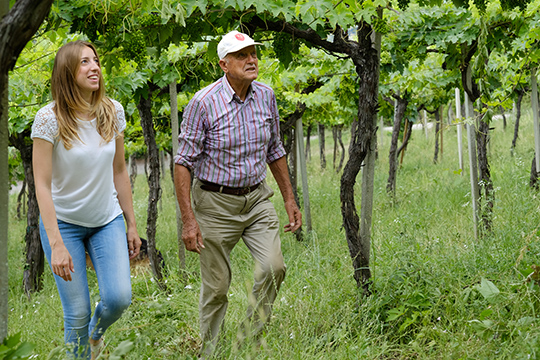
Emidio Pepe has always embraced tradition, learning to make wine from his father and grandfather and avoiding the seductions of modern technologies and approaches. Today he is widely regarded as one of Italy's top winemakers. The Pepe family remains dedicated to an artisanal winemaking tradition, still crushing grapes with their feet as a family and working with the traditional pergola vine training system. They are responsible for showcasing on the international stage the ageing potential of Montepulciano.
The Pepe vineyards are located on the northern edge of Abruzzo between the highest mountains of the Apennines and the Adriatic coast, and boast siliceous soil rich in lime and iron. Grapes are grown biodynamically, hand-harvested, hand-destemmed, naturally fermented and aged 18-24 months in glass-lined concrete tanks. The wines are bottled unfined and unfiltered, without added SO2, and aged in their cellar, in bottles, for continued development.
Grape Collective talks to Chiara De Iulis Pepe, the fifth generation at the estate, about the story of her grandfather Emidio and the family's artisanal approach to winemaking.
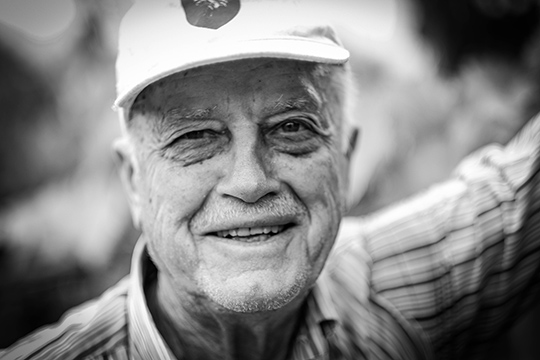 Christopher Barnes: So Chiara, tell us a little bit about the history of the Emidio Pepe estate.
Christopher Barnes: So Chiara, tell us a little bit about the history of the Emidio Pepe estate.
Chiara De Iulis Pepe: Well, Grandfather started making wine in this place in 1964. And before him his father and his grandfather were making wine as well and that's how he as a kid learned how to make wine, by spending time with his grandfather and learning as much as he could. And then at the age of 32 he decided to make a life out of wine and that's when he started working the hectare that we have right in front of the house and making bottles. Before the wine used to be produced and not bottled and then after he started he began bottling that wine and selling it.
And what were his winemaking influences, because he's taken a very unique path?
That's very interesting because he didn't really have anyone to look at except his grandfather and back in those days, we are talking here late 1800s, and for him they were clearly making wine in a very artisanal approach. Since then nothing has really changed. We are still using the same kind of tools and the same kind of winemaking techniques and that's because back in the day they were making wine by respecting traditional winemaking and that's what we do today. Still foot-trodding and still hand de-stemming. What is interesting for him is being very respectful towards nature and being very hands-off in terms of winemaking; that has always been the way to do it. He didn't know any influences to follow so I think that for him that was the most important thing. He didn't have anyone to look at so he could only do it his own way.
So Chiara let's talk a little bit about Abruzzo, it's a pretty big wine region.
It is.

(Chiara De Iulis Pepe with Emidio Pepe)
You have a lot of different wine regions within it.
Yes, so diverse and so many microclimates involved. We are lucky it's a region that is right in the center of Italy and right on the edge of the Adriatic coast and here at Pepe we are in the northernmost part of Abruzzo and very close to the Adriatic Sea. So we basically have the Adriatic 10 kilometers away and we have the Gran Sasso which is the highest peak of the Apennines 60 kilometers away, so in 80 kilometers you go from almost 2,000 meters to the sea level. So it's really really steep and you have a lot of sea breezes constantly coming up and you have a lot of cold air coming from the mountains at night and so it is such a unique combination of elements that also allowed Grandfather to make wine in a very very windy area. He was lucky enough not to have to put a lot of stuff to protect his vineyards from mildew and diseases because this microclimate was kind of allowing him to have pretty healthy grapes just without a lot of attention needed.
But back in the day this area was clearly all covered by water so the soils are just full of salt and minerals just because of the sea. And now we have a lot of clay on the topsoil and then it's all limestone in the bottom so the roots just go deeply into the limestone and just try to get everything from it. Grandfather clearly has never used any chemicals so the roots just go deep into the soil to look for everything they need from water to minerals and salts to nourishment.
Now the very old vineyards that we have go back to six or seven meters so its quite good luck.
Natural winemaking is one of those terms that is a little bit vague and controversial.
Yes.

(Chiara De Iulis Pepe and Rosa Pepe)
You're described as a natural winemaker, how do you feel about that term, what does it mean to you?
I don't know, for us we've only had one way of winemaking and it has always been the same. We've never changed. Grandfather started more than 50 years ago doing all spontaneous fermentation, never filtering, never adding massive quantities of sulfites. And never using any chemicals in the vineyard but for him that was just his sincere way of approaching a vineyard and a wine with respect. And now it gets called natural but I like to call it just an artisanal approach to winemaking and a respectful approach to winemaking.
I don't like that it could ever follow a trend. Because Grandfather has always been so detached to trends and always had his own way. And that has never changed and so now it's called natural. It's much more than a certain word, it's a style of life. Eating the vegetables when they're really in season is just looking at the vineyard with sensibility and attention and a certain capability of observing and understanding that makes it special. It makes it work by just having a soil that can be as alive as possible. It can have as much oxygen as possible so that life can be in it because when you have a spongy soil you have a lot of oxygen. And when there's oxygen there's life, so a lot of bacterial insects are living and working in the soil. Having a system of microclimates with very specific clones and a very specific terroir where they manage to live on their own with very little help from the winemaker.
Throughout all his life Grandfather thought he was just a helper but never an influencer of the vineyard of the wine. He always wanted to preserve the purity of fruit and the purity of flavors in the vineyards just so that the grape varietal could express as much as possible in his wines and just to make sure that you could bottle something that has a sense of place.
Something that could tell how the season was and clearly would never have all incredible vintages every year. We have different vintages, we have better vintages, we have worse vintages, but each one of them has to tell a story. It's the responsibility that we feel to bottle something that is true that is exactly what happened in the vineyard. We aren't trying to make it better. And clearly when nature gives us perfection we are able to bottle something that is closer to perfection but when it's not it's just a truthful expression of the season. And that's why Grandfather always loved to age his wines in a way because that was a bit the historical function of the wine, just registering and monitoring climate conditions and just making sure as you open a bottle of a very old vintage that it could tell your history of that old vintage.
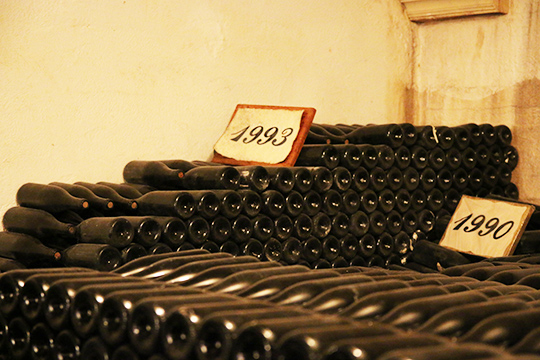 So aging is a very unique part of Emidio Pepe's story.
So aging is a very unique part of Emidio Pepe's story.
It is, since the real beginning, Grandfather decided that his wines needed age and so his first cellar that he built was an aging cellar. So he could keep making the wine at the bottom of his house, no problem, but he needed a dark, cold and humid space in order to make his wine age. And to him it was just clear and evident since the real beginning that those two grapes were not only good to be aged but they needed age in order to develop and express as they were meant to. Grandfather says that you're not tasting Trebbiano and Montepulciano if you're tasting them young. You're just tasting them as they are in the process of becoming a real Trebbiano and Montepulciano.
That was real because we work it with those two different indigenous grape varietals because in two ways they need time to get their own dimensions. Trebbiano when it's young starts very austere, very tight, very sharp with a great tension and great acidity. Then it needs time to get to its own dimension, to get the complexity, to get the minerality brighter, to get really all the elements united and with integrity.
So let's talk a little bit about the aging. How many bottles do you keep and how many bottles get released and when do they get released?
So normally we age 50% of the production of Montepulciano every year. On average we make 50,000 bottles of Montepulciano every year and then 30,000 of white in between Trebbiano and Pecorino. But out of that 50% of the 50,000 bottles of Montepulciano, half of the aging gets stocked into the winery until we decide to release them. On a very very good season in which we see a bit of better potential we then decide on a higher percentage. But on average it's 50%. And then we start to re-release that 50% after six or seven years, it really depends on how the wine is tasting. We do one tasting a year for all the family and we taste all the vintages we have in the cellar. And that is when we really monitor the evolution and we monitor how the wine is changing, evolving, getting better. We like to release when the wine is really starting to express as we want it to so that normally starts after six or seven years. At that point we start releasing very small quantities.
In fact our aging cellar is a cellar in constant movement in which young vintages survive and wait for five or six years and then all the other vintages at the same time in different proportions get released. And what is interesting is that before we release, every bottle is reopened and hand-decanted, one by one, to remove the sediments that naturally occur because the wine is never filtered. This way we make sure to check and control every bottle before release to make sure that the bottle that we release has no sediment and has a new cork for potential future aging as well.
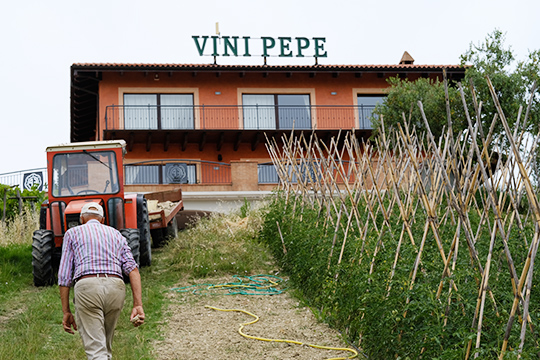
When you age Montepulciano, how does it evolve over time?
That's difficult. It changes a lot according to the seasons I would say and so if you think of a very very balanced season that you start with, that means rain at the right time and sun at the right time. You have something that starts with incredible power and incredible juiciness, and you can really see the potential by tasting it. You have this bright acidity that makes you understand that this wine is really going to age forever. And then as long as you wait, it's kind of the integrity gets there and the quality of tannins change a lot in my opinion. Its just that the tannins get much more elegant. Everything gets together in a completely different way. For us, aging has been interesting because we see complexity and depth arriving. Grandfather really never wanted to make simple wine, for him it was of no interest, he wanted to make wine that by just opening the bottle would make people think. And that was pretty much the idea of aging. Having something that could have much more complexity than the young wine, much more to tell.
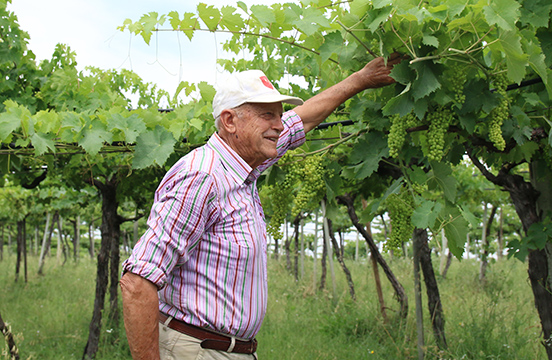 And as I was growing up I always had him telling me that when you are drinking something very young, it's just like having a chat with a kid, it's just what else can you say to him? And then when you take something older like 10 to 15 years it's like talking to an adult so you can kind of have a good discussion with them. But when you taste a 30-year-old wine it's like listening to an old man tell you his whole life. And that's a completely different experience, it's just you learn much more out of the wine. And that's pretty much what he wanted to do with Montepulciano. He thought that wine could have a lot to tell so he's just giving the wine the opportunity to tell the story.
And as I was growing up I always had him telling me that when you are drinking something very young, it's just like having a chat with a kid, it's just what else can you say to him? And then when you take something older like 10 to 15 years it's like talking to an adult so you can kind of have a good discussion with them. But when you taste a 30-year-old wine it's like listening to an old man tell you his whole life. And that's a completely different experience, it's just you learn much more out of the wine. And that's pretty much what he wanted to do with Montepulciano. He thought that wine could have a lot to tell so he's just giving the wine the opportunity to tell the story.
And what are some of the oldest vintages that you've tasted?
I was lucky enough to taste the first vintage that my grandfather made, so 1964. In 2014, we turned 50 harvests so we did a big vertical tasting. Starting in 2010 there was the youngest iconic vintage that we've had going back to 1964 and accordingly to the 30 people that we had over for the tasting the 1964 decided to be the best wine at the tasting. It still had an incredible vibrancy and energy. We also have to say the '64 has been quite a good season in Italy, all over. It clearly started with the quality and grapes that were really really healthy to start with but then it's just aged gracefully. It didn't lose tannins, character, integrity it just kept its strength.
So the wine world has seen a lot of new technology. Have there been any changes at Pepe?
No change at Pepe. No we're still making the wine exactly how Grandfather started with the same tools so we don't have any machines at the winery. Everything is made still today by hand. So all the whites, Trebbiano and Pecorino are still crushed by feet to following the old production. The reds are hand-destemmed so we just push the grapes back and forth so that the berries fall down and the stems remain in the top. Grandfather always thought that that was the key in order to have a very elegant Montepulciano because doing it by hand you'll never break the stem. And the stem of the Montepulciano is quite a bitter stem so you don't want to really involve it in the vinification process. Only doing it by hand you are 100% sure that the stem was not getting involved in the vinification process.
And then everything ferments in concrete so it's all spontaneous fermentation. We tend to do quite short macerations on the reds and there is no maceration at all on the Trebbiano. There's never been any filtration so we don't have a filter. We try to do everything by gravity even though we have a pump, that's the only innovative thing we have. And then the wine generally stays in tank for two years and then gets bottled. So still the wine coming from the old vineyard that's gonna get stocked in the cellar again is still bottled by gravity.
Take a 360-degree virtual reality tour of the Emidio Pepe winery in Abruzzo, Italy. This experience only works in certain browsers including Google Chrome. You can also experience the VR tour directly on Youtube.
How do the vintages differ from year to year and how does that reflect in the wine?
It's quite a big influence of the differences of climate into the wine and it is true that on average Abruzzo is really sunny. So we have a warm season, we have hot summers. Its warm, not dry, so normally the vintage would really struggle in the vintage in which it's warm and dry as well, which is normally something that we are not used to, like the recent 2017 for example. But when we have a lot of rain clearly you have a lot of higher acidity, the tannins will be much more refined and less powerful than a normal vintage in which we generally have much more sun. And so you'll have a young Montepulciano that starts with high, high acidity especially tartaric acidity because of the rain and then very delicate and softer tannins. So the wine is really integrated when it's young and then we see that with time, the rainy season tends to turn into an elegant and refined Montepulciano and it's a quality of refinement we never have from warm seasons.
On the other hand, in warm seasons we have this leathery aspect that is typical from Pepe at the same time and then with time it manages to retain the character, the power, the matter, so with time they really age incredibly well. Clearly the balance and what we like is always in the middle so the seasons in which they have rain at right time and sun at the right time. For us the ideal season will be a very very cold winter. Normally we always get snow from the Gran Sasso, so we always have at least 20 cm of snow, a quite rainy spring and then a hot summer. But my grandad loves that during the summer, like in the highest peak of heat we get some rain. Because he says that when the vineyard's in the highest need of water and the water comes that's when the vines benefit the most out of the water and they manage to develop quite high acidities that will keep the wine tight and vibrant for a very long time. So that's the ideal pretty much and that's when you'll have those iconic seasons that we then clearly age and stock much more because we know they are gonna age better.
For more on Emidio Pepe check out Monty Waldin's interview on SoundCloud.
Photography and videography by Piers Parlett.
Video editing by Max High-Cuchet.














